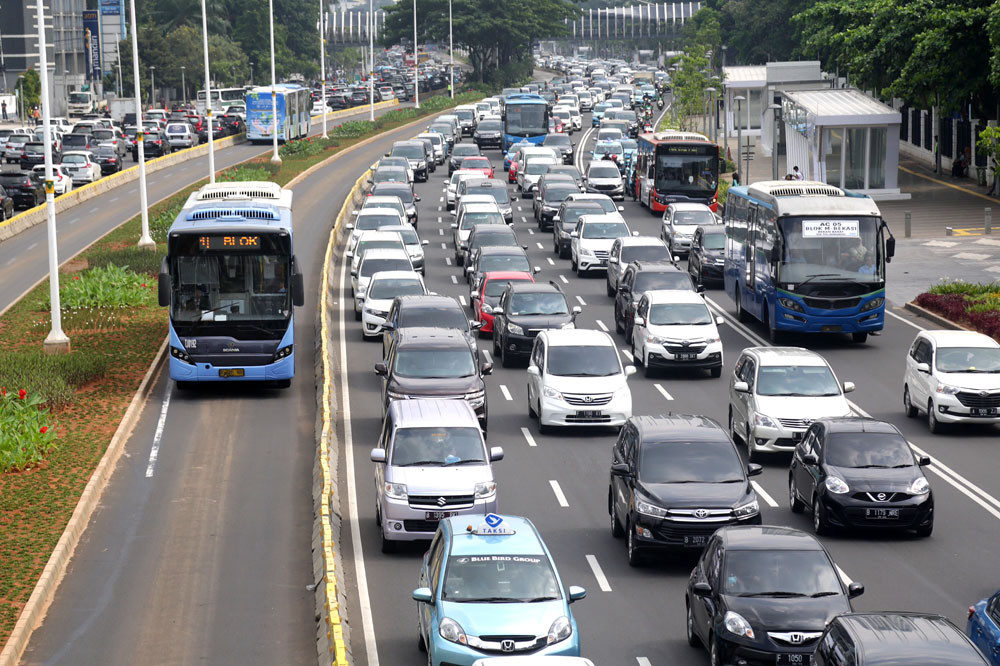Popular Reads
Top Results
Can't find what you're looking for?
View all search resultsPopular Reads
Top Results
Can't find what you're looking for?
View all search resultsLess congested Jakarta
Better traffic congestion levels obviously is an achievement for a metropolitan city like Jakarta, but it is far from enough. When celebrating its 492nd birthday, Jakarta must double down on its efforts to make the city a better place to travel.
Change text size
Gift Premium Articles
to Anyone
S
everal days before celebrating its 492nd anniversary, Jakarta received a birthday present from the TomTom Traffic Index, which announced that the Indonesian capital had improved on its traffic congestion level. Throughout 2018, the city’s average congestion level stood at 53 percent, as against 61 percent the year before.
According to TomTom, Jakarta had the biggest improvement among 403 cities from 56 countries surveyed. Jakarta, however, still ranks seventh among cities grouped in the “red zone” or the worst in terms of traffic congestion.
TomTom found that motorists in Jakarta spend an extra 19 minutes per 30-minute trip during morning rush hours and 26 minutes per 30-minute trip in the evening in 2018, down from 22 and 30 minutes respectively in 2017.
Los Angeles, Tokyo, Beijing, Kuala Lumpur and Singapore were in the “darker yellow zone” with 41, 41, 40, 36 and 31 percent of congestion levels respectively. Those in the “green zone” or without congestion were mostly small cities in the United States that most people have never heard of, such as Greensboro-High Point.
Some experts and policymakers admit that Jakarta’s traffic improved greatly during the Asian Games in August last year. This could factor in average congestion levels. During the two-week event, the Greater Jakarta Transportation Agency, the city administration and the Jakarta Police pulled out all the stops to make sure athletes could reach the Games’ venues unhindered. One of the policies was expanding the odd-even traffic policy at the toll gates connecting the capital with its satellite cities.
Another factor was completing the construction of infrastructure like underpasses and overpasses, including those at railway crossings. The completion of the infrastructure was not the only reason behind the easing of traffic, however. Construction work, which often worsens congestion, was put on hold during the Asian Games.
The Asian Games eased Jakarta’s traffic, albeit only briefly. Innovations in the city’s traffic management contributed the most to traffic improvement. Jakarta’s consistent traffic policies over the years, particularly restrictions on private cars in the city and improvement in public transportation services, were the key.
Most urban experts and policymakers would agree that the odd-even policy works. It has shifted people from private cars to public transportation. The number of Transjakarta bus and commuter line train passengers has steadily increased. In 2018, commuter train passengers totaled 320 million, while the number of Transjakarta bus passengers stood at 189.7 million, up from 315.8 million and 144.7 million respectively in 2017.
We may expect less congestion in the years to come with the opening of the MRT and the two soon-to-be-opened LRT lines.
Better traffic congestion levels obviously is an achievement for a metropolitan city like Jakarta, but it is far from enough. When celebrating its 492nd birthday, Jakarta must double down on its efforts to make the city a better place to travel. The “limit private vehicles and improve public transportation” formula has proven effective in bringing Jakarta closer to less congested neighbors like Kuala Lumpur or Singapore.










